Translation 我对翻译的看法
谈谈对翻译的理解英文作文

谈谈对翻译的理解英文作文Translation is a fascinating and complex process that requires not only linguistic skills but also cultural understanding and creativity. It is not simply about converting words from one language to another, but about conveying the meaning and nuance of the original text in a way that is natural and understandable to the target audience.Translation is like a bridge between different cultures and languages, allowing people to communicate andunderstand each other. It is a way to break down barriers and build connections between people who may not share a common language. Through translation, ideas, stories, and knowledge can be shared across borders, enriching our understanding of the world and fostering global cooperation.One of the challenges of translation is capturing the essence and style of the original text. Each language hasits own unique way of expressing ideas and emotions, and agood translator must be able to adapt the text to ensure that it resonates with the target audience. This requires not only a deep understanding of the source and target languages, but also a keen sense of cultural context and sensitivity.Translation is not a mechanical process, but a creative one. Translators often face the dilemma of choosing between literal accuracy and capturing the spirit of the original text. They must make decisions about word choice, sentence structure, and tone to ensure that the translation is faithful to the original while also being natural and engaging to the reader. It is a delicate balancing act that requires both skill and intuition.Technology has greatly facilitated the translation process, with the development of machine translation tools and software. While these tools can be helpful in certain situations, they are far from perfect and cannot replace the human touch. A machine may be able to translate words, but it often lacks the ability to understand the cultural nuances and context that are crucial to a successfultranslation. Human translators bring their own experiences, knowledge, and creativity to the task, ensuring that the final result is not just a literal translation, but a true reflection of the original text.In conclusion, translation is a complex and multifaceted process that requires linguistic skills, cultural understanding, and creativity. It is a bridge between different languages and cultures, allowing for communication and understanding. Translators face the challenge of capturing the essence and style of theoriginal text, while also adapting it to resonate with the target audience. Technology has its place in thetranslation process, but human translators bring their own unique skills and intuition to ensure a successful translation.。
translation词根
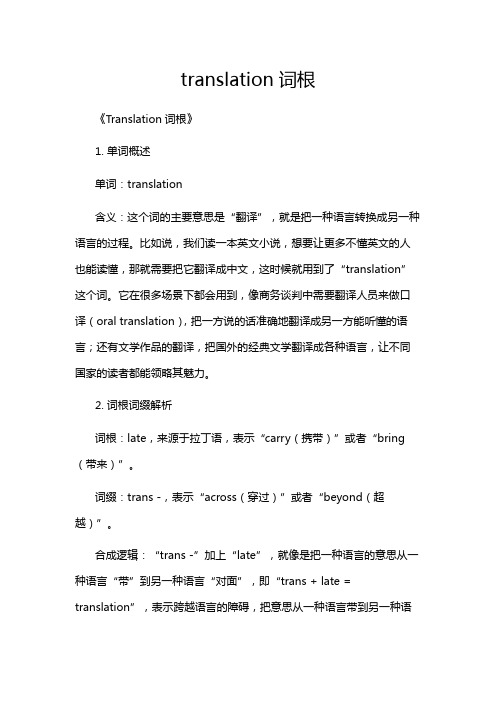
translation词根《Translation词根》1. 单词概述单词:translation含义:这个词的主要意思是“翻译”,就是把一种语言转换成另一种语言的过程。
比如说,我们读一本英文小说,想要让更多不懂英文的人也能读懂,那就需要把它翻译成中文,这时候就用到了“translation”这个词。
它在很多场景下都会用到,像商务谈判中需要翻译人员来做口译(oral translation),把一方说的话准确地翻译成另一方能听懂的语言;还有文学作品的翻译,把国外的经典文学翻译成各种语言,让不同国家的读者都能领略其魅力。
2. 词根词缀解析词根:late,来源于拉丁语,表示“carry(携带)”或者“bring (带来)”。
词缀:trans -,表示“across(穿过)”或者“beyond(超越)”。
合成逻辑:“trans -”加上“late”,就像是把一种语言的意思从一种语言“带”到另一种语言“对面”,即“trans + late = translation”,表示跨越语言的障碍,把意思从一种语言带到另一种语言,这就是“翻译”的意思。
3. 应用短文与场景应用短文1:I was at this international conference last week. There were people from all over the world. And you know what? The whole event would have been a total mess without the translation services. I met this one translator, let's call him Jack. Jack was running around like a busy bee. He was doing simultaneous translation. I heard him say, "Translation is like building a bridge between different cultures. Without it, we'd all be on separate islands, just talking to ourselves in our own languages." And he was so right! I mean, think about it. When a Chinese businessperson is trying to close a deal with a French company, if there's no translation, it's like they're speaking two completely different languages - well, they are, literally! But it's not just about the words. It's about the ideas, the culture behind those words. A good translation can make or break a deal. It can turn a potential conflict into a harmonious partnership. So, every time I see those translators at work, I'm just in awe. They're like the unsung heroes of the international community.中文翻译:我上周参加了一个国际会议。
英译汉翻译心得体会
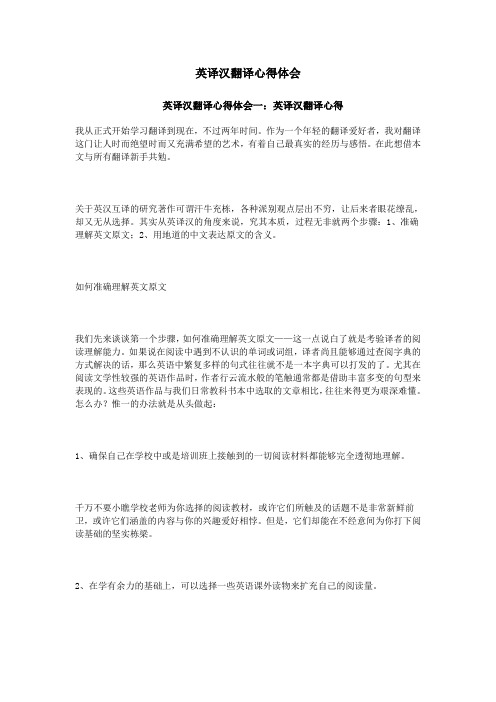
英译汉翻译心得体会英译汉翻译心得体会一:英译汉翻译心得我从正式开始学习翻译到现在,不过两年时间。
作为一个年轻的翻译爱好者,我对翻译这门让人时而绝望时而又充满希望的艺术,有着自己最真实的经历与感悟。
在此想借本文与所有翻译新手共勉。
关于英汉互译的研究著作可谓汗牛充栋,各种派别观点层出不穷,让后来者眼花缭乱,却又无从选择。
其实从英译汉的角度来说,究其本质,过程无非就两个步骤:1、准确理解英文原文;2、用地道的中文表达原文的含义。
如何准确理解英文原文我们先来谈谈第一个步骤,如何准确理解英文原文——这一点说白了就是考验译者的阅读理解能力。
如果说在阅读中遇到不认识的单词或词组,译者尚且能够通过查阅字典的方式解决的话,那么英语中繁复多样的句式往往就不是一本字典可以打发的了。
尤其在阅读文学性较强的英语作品时,作者行云流水般的笔触通常都是借助丰富多变的句型来表现的。
这些英语作品与我们日常教科书本中选取的文章相比,往往来得更为艰深难懂。
怎么办?惟一的办法就是从头做起:1、确保自己在学校中或是培训班上接触到的一切阅读材料都能够完全透彻地理解。
千万不要小瞧学校老师为你选择的阅读教材,或许它们所触及的话题不是非常新鲜前卫,或许它们涵盖的内容与你的兴趣爱好相悖。
但是,它们却能在不经意间为你打下阅读基础的坚实栋梁。
2、在学有余力的基础上,可以选择一些英语课外读物来扩充自己的阅读量。
对具体英语读物的选择其实还是有些讲究的。
比如,有些学生对文学类作品很感兴趣,但并不意味着他们在一开始就该选择那些厚得像砖块一样的原版名著来阅读,因为这样做无异于“自杀”。
究其原因,仅其中的生词就足以使阅读者信心全无。
那么,那些有中英文对照的版本是否能称为上佳之选呢?答案依然为否。
因为这极易激发读者的惰性,尤其对阅读量有限的读者来说更是如此。
对此我的建议是,选择那些名著的缩写本,并且是配有详细注释的版本。
在阅读过程中,读者往往很难定位陌生的词组或表达。
对翻译的认识

对翻译的认识翻译是一种将一种语言转化为另一种语言的能力或技巧。
翻译的目的是为了使不同语言之间的沟通变得更加顺畅和有效。
翻译者可以翻译各种文本,包括书籍、文章、宣传资料、新闻报道、电影字幕以及口译等。
翻译的存在是为了满足不同语言使用者之间的交流需求。
在全球化进程不断加速的今天,翻译的重要性显得愈发突出。
无论是商务交流、学术研究、文化交流还是政治外交,都离不开翻译的支持。
翻译在各个领域都扮演着重要的角色,促进了国际交流与理解。
翻译的过程需要对原文进行理解,然后将其转化为另一种语言。
这不仅需要对两种语言的掌握,还需要对两种语言文化背景的了解。
翻译是一种创作活动,翻译者需要根据原文的风格和语境,选择合适的词语和句式,以传达原文的意义和表达方式。
在翻译过程中,翻译者还需要注意语法、语音、语调等方面,以确保译文的准确性和流畅性。
翻译具有很大的挑战性,因为每种语言都有其独特的语言结构、词汇和表达方式。
不同语言之间存在着词义的差异、语法结构的不同以及文化隐喻的差异,这使得翻译工作更加复杂。
翻译者需要根据不同的语言特点,在保持准确性的前提下,尽可能地接近原文的意义和表达方式。
翻译的质量评估是一个重要的问题。
翻译应该是准确、流畅和自然的。
准确性是最基本的要求,翻译应该准确传达原文的意思,不能产生歧义或误解。
流畅性是指译文的语言应该通顺,符合目标语言的习惯用法和语音规律。
自然性是指译文应该看起来像是本地人写的,而不是机器翻译或生硬的翻译。
随着机器翻译技术的不断发展,翻译行业也在发生变化。
机器翻译能够根据事先编好的算法,自动将一种语言转化为另一种语言。
尽管机器翻译在某些场景下有一定的应用价值,但是在很多情况下,机器翻译仍然无法替代人工翻译。
因为机器翻译无法理解原文的语境和文化背景,无法进行语言创作和语境推测。
此外,不同语言之间的差异和文化隐喻使得机器翻译难以达到人工翻译的准确性和自然性。
总的来说,翻译在跨语言交流中起着重要的作用。
英汉翻译的方法——直译、意译与归化、异化
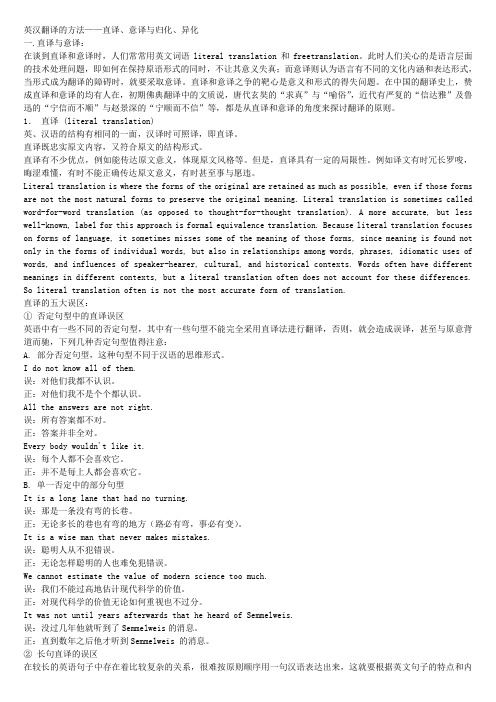
英汉翻译的方法——直译、意译与归化、异化一.直译与意译:在谈到直译和意译时,人们常常用英文词语literal translation 和freetranslation。
此时人们关心的是语言层面的技术处理问题,即如何在保持原语形式的同时,不让其意义失真;而意译则认为语言有不同的文化内涵和表达形式,当形式成为翻译的障碍时,就要采取意译。
直译和意译之争的靶心是意义和形式的得失问题。
在中国的翻译史上,赞成直译和意译的均有人在,初期佛典翻译中的文质说,唐代玄奘的“求真”与“喻俗”,近代有严复的“信达雅”及鲁迅的“宁信而不顺”与赵景深的“宁顺而不信”等,都是从直译和意译的角度来探讨翻译的原则。
1.直译 (literal translation)英、汉语的结构有相同的一面,汉译时可照译,即直译。
直译既忠实原文内容,又符合原文的结构形式。
直译有不少优点,例如能传达原文意义,体现原文风格等。
但是,直译具有一定的局限性。
例如译文有时冗长罗唆,晦涩难懂,有时不能正确传达原文意义,有时甚至事与愿违。
Literal translation is where the forms of the original are retained as much as possible, even if those forms are not the most natural forms to preserve the original meaning. Literal translation is sometimes called word-for-word translation (as opposed to thought-for-thought translation). A more accurate, but less well-known, label for this approach is formal equivalence translation. Because literal translation focuses on forms of language, it sometimes misses some of the meaning of those forms, since meaning is found not only in the forms of individual words, but also in relationships among words, phrases, idiomatic uses of words, and influences of speaker-hearer, cultural, and historical contexts. Words often have different meanings in different contexts, but a literal translation often does not account for these differences. So literal translation often is not the most accurate form of translation.直译的五大误区:①否定句型中的直译误区英语中有一些不同的否定句型,其中有一些句型不能完全采用直译法进行翻译,否则,就会造成误译,甚至与原意背道而驰,下列几种否定句型值得注意:A. 部分否定句型,这种句型不同于汉语的思维形式。
对翻译的理解
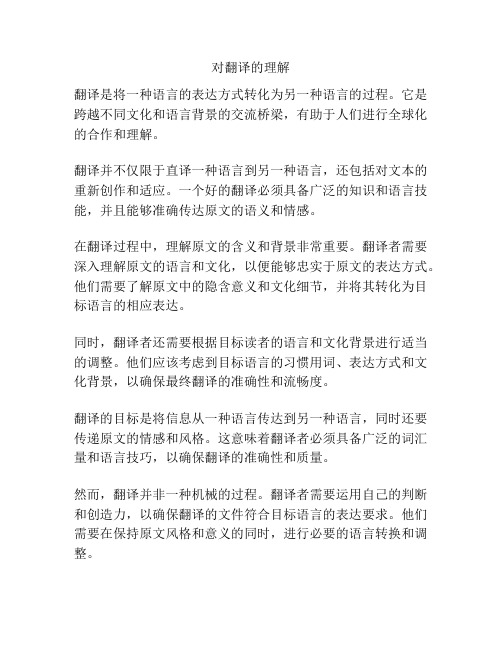
对翻译的理解
翻译是将一种语言的表达方式转化为另一种语言的过程。
它是跨越不同文化和语言背景的交流桥梁,有助于人们进行全球化的合作和理解。
翻译并不仅限于直译一种语言到另一种语言,还包括对文本的重新创作和适应。
一个好的翻译必须具备广泛的知识和语言技能,并且能够准确传达原文的语义和情感。
在翻译过程中,理解原文的含义和背景非常重要。
翻译者需要深入理解原文的语言和文化,以便能够忠实于原文的表达方式。
他们需要了解原文中的隐含意义和文化细节,并将其转化为目标语言的相应表达。
同时,翻译者还需要根据目标读者的语言和文化背景进行适当的调整。
他们应该考虑到目标语言的习惯用词、表达方式和文化背景,以确保最终翻译的准确性和流畅度。
翻译的目标是将信息从一种语言传达到另一种语言,同时还要传递原文的情感和风格。
这意味着翻译者必须具备广泛的词汇量和语言技巧,以确保翻译的准确性和质量。
然而,翻译并非一种机械的过程。
翻译者需要运用自己的判断和创造力,以确保翻译的文件符合目标语言的表达要求。
他们需要在保持原文风格和意义的同时,进行必要的语言转换和调整。
翻译的好坏对于跨文化交流非常重要。
一个优秀的翻译可以帮助人们消除语言和文化之间的障碍,促进不同国家和不同文化之间的理解和合作。
翻译也可以帮助文化和知识的传播,让更多的人了解和体验各种文化。
总之,翻译是一项复杂而重要的任务。
它要求翻译者具备深厚的语言和文化背景知识,以及高超的语言技能和创造力。
一个好的翻译能够准确传达原文的语义和情感,帮助人们跨越语言和文化的障碍,在全球范围内建立合作和理解。
最新浅谈英语翻译中的直译和意译

浅谈英语翻译中的直译和意译一)、Literal translation 直译(异化法foreignization )Free translation 意译(归化法domestication)英、汉两种语言在结构和语义表达方面存在着雷同和差异,翻译时有时用直译,有时用意译。
(1)、直译(Literal translation)指不仅忠实于原文内容,而且忠实于原文形式的翻译方法.直译把忠于原文内容放在第一位,把忠于原文形式放在第二位,要求在保持原文内容的前提下,力求使译文与原文在选词用字、句法结构、形象比喻及风格特征等方面尽可能趋同(无限接近)。
直译把通顺的译文形式放在第三位。
(1.1)直译的应用:(1.1.1)某些习语和短语的翻译,例如cold war 冷战hot line 热线spicy girl 辣妹black market 黑市paper tiger纸老虎Blood is thicker than water 血浓于水The heart is seen in wine. 酒后吐真言(1.1.2)含义广为流传,读者较为熟悉的短语、习语等, 直译可以丰富译语语言。
例如:A. He walked at the head of the funeral procession, and every nowand then wiped his crocodile tears with a big handkerchief.他走在送葬队伍的前头,还不时用一条大手绢抹去那鳄鱼的眼泪。
B. The Senate Foreign Relations Committee today extended the olivebranch to the Clinton Government by pleading for cooperation indeveloping foreign policy.参议院外交委员会今天向克林顿政府伸出了橄榄枝,要求在发展外交政策上合作。
浅谈汉译英的理解问题

浅谈汉译英的理解问题汉译英是指以汉语为母语的人从汉语中翻译出英语的过程,它是一种文化交流的手段。
在汉译英过程中,理解问题是一个重要的环节,它是决定汉译英翻译质量的关键因素。
首先,汉译英的理解问题需要翻译者深入挖掘原文的含义,仔细理解汉语的语义特征,把握原文的表达方式,力求在英语中表达出原文的本意。
其次,翻译者要掌握汉语和英语的语法特点,以汉语为母语的人要学会用英语表达汉语的思想,而不是把汉语的思想直接翻译成英语。
最后,翻译者要学会用英语表达汉语的文化内涵,以便在英语中表达出汉语文化的精髓。
总之,汉译英的理解问题是一个复杂的过程,需要翻译者具备良好的语言能力和文化素养,以便更好地理解原文,把握原文的表达方式,并有效地表达汉语的文化内涵。
In Chinese-English translation, understanding is a key factor that determines the quality of the translation. Firstly, the translator should deeply explore the meaning of the original text, understand the semantic features of Chinese and grasp the way of expression of the original text, so as to express the original meaning in English. Secondly, the translator should master the grammar features of Chinese and English, and learn to express Chinese thoughts in English instead of directly translating them into English. Finally, the translator should learn to express the cultural connotation of Chinese in English, so as to express the essence of Chinese culture in English.In conclusion, understanding in Chinese-English translation is a complex process, which requires the translator to have good language ability and cultural literacy, so as to better understand the original text, grasp the way of expression of the original text, and effectively express the cultural connotation of Chinese.。
英汉互译课程心得体会(精选5篇)

英汉互译课程心得体会(精选5篇)第一篇:英汉互译课程心得体会《英汉互译》课程学习体会接触英汉互译快一年了,自己对翻译的认识也有很大的改变。
以前,觉得翻译只要学过英语都会做的,可是现在才发现翻译是一门很大的学问。
不仅要求精通英语这门语言,而且要了解英语表达习惯,同时也要具有相当好的语文功底。
在翻译过程中,差了哪一点就不能有好的翻译作品。
在学习这门课的同时,也让我了解了很多关于翻译和各方面的知识。
一.了解翻译的历史。
以前,完全不知道翻译这门学问是多么博大精深,而且是从古至今源远流长。
知识人文在现在社会翻译才成为了必需品。
在学习的过程中,我了解了翻译是从古代就开始了,远到有记载完整的时期是唐朝,发现中国上下五千年还是有很多精髓的地方等着我们去发现,这刺激我去阅读有关中国古代历史和文化相关的书。
在这其中,我发现了很多新奇的知识,同时也明白自己对中国了解的实在是太少了。
二.了解翻译的流派及翻译思想。
每个人对翻译的领会和认识促成了每个人对翻译有不同的理解,翻译出来的文章也就有了差异性。
翻译的流派随着翻译的不断发展形成了几大翻译的派别。
同时,翻译也是要受到当时社会氛围的影响的。
当时需要怎样的作品来符合当时的社会环境,翻译作品就出现了,“忠实”与“不忠实”,“信、达、雅”,“直译”和“意译”等翻译思想不断出现。
我们不能说哪个好,还是哪个不好,只有结合在当时的社会背景来分析翻译的作品。
在这过程中,我认识了很多翻译名家,知道了有关他们的许多有趣的小故事,了解了他们对翻译的贡献与付出。
这都是一个个的励志故事,无论是对我翻译和我的人生都有很大的启迪。
三.了解翻译的规律和技巧。
上课期间所讲授的“重复和替换”,“增词法”等技巧,这些技巧看似通俗易懂,但是在实际运用中我还是欠缺很多。
以前没接触翻译的时候,认为翻译就从字面意思翻译过来,并且语句通顺就可以了。
可是上了这个课之后我才发现,翻译不仅仅是把意思翻译过来,而且要结合该国的文化背景和语言习惯表达出来,这样才算好的翻译。
英译汉翻译心得体会共4篇

英译汉翻译心得体会共4篇
篇一:翻译心得体会
翻译心得体会
学习英语,从初中到现在,也接近十年了,过程里,虽经常遇到英汉和汉英对照,但每每总是偏于一边,要么注重英语表达,要么只为看懂中文译文。
两者合而为一,把一种语言转换成另一种,在过程里去推敲一字一句的表述和意思,这在以前几乎是很少的事。
迷糊接触翻译也就短短的三月左右,十几个星期,短短的时间段里似乎明白了些什么,学到些什么技巧,但往往拿起一篇文章,又总难下笔翻译。
总会因为一两个词而犯难,或者明知一篇文章的主要意思,却不能用汉语很好的表达出来。
傅雷先生曾说过:“翻译重在实践。
” 一回生,二回熟,日积月累,第一手经验多了,做起来便得心应手,翻译能力也就有所提高。
正是因为我练习太少,专研太少,翻译也就仅仅只停留在了表层阶段,深入不了。
或许就是因为这样的原因,我翻译出的东西,总是字不正腔不圆,和标准译文有很大的差距,词句的表达上,既没有很好的尊重到原著的思想,也没有能体现出汉语表达上的优美和准确。
很多情况下,还会出现断章取义,望文生义,词不达句。
现在我们主要的方向都是在英译汉上,这首先遇到的一个问题就是透彻地理解原文。
看一篇东西,可以有不同的目的。
若为获取信息,抓住大意就可以了。
若是为了消遣,那就可以看懂多少算多少。
若是为了翻译,那就非透彻理解原文不可。
有时似乎觉得懂了,但翻译起来还是不知如何下手,究其原因,可能仍是未能真正理解原文。
如果是自己尝试着研究一篇译文的时候,要么可以先不看译文,自己先根据原文翻译一遍,然后拿自己的译文和名家的译文相比较,从差距中就可以看。
浅析英汉互译中的直译与意译
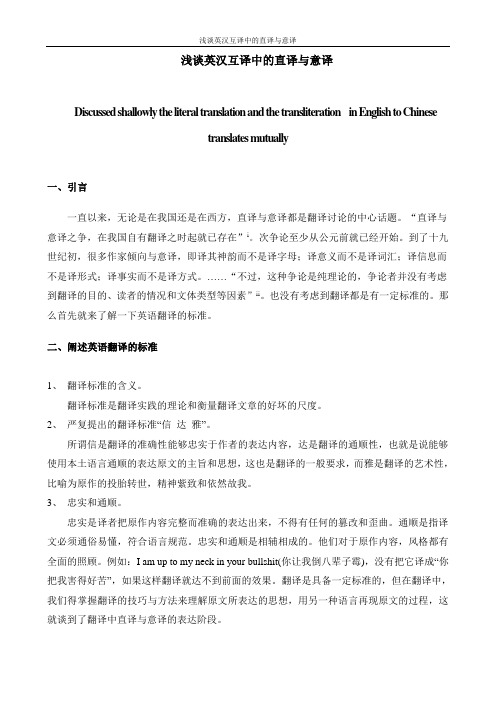
浅谈英汉互译中的直译与意译Discussed shallowly the literal translation and the transliteration in English to Chinesetranslates mutually一、引言一直以来,无论是在我国还是在西方,直译与意译都是翻译讨论的中心话题。
“直译与意译之争,在我国自有翻译之时起就已存在”i。
次争论至少从公元前就已经开始。
到了十九世纪初,很多作家倾向与意译,即译其神韵而不是译字母;译意义而不是译词汇;译信息而不是译形式;译事实而不是译方式。
……“不过,这种争论是纯理论的,争论者并没有考虑到翻译的目的、读者的情况和文体类型等因素”ii。
也没有考虑到翻译都是有一定标准的。
那么首先就来了解一下英语翻译的标准。
二、阐述英语翻译的标准1、翻译标准的含义。
翻译标准是翻译实践的理论和衡量翻译文章的好坏的尺度。
2、严复提出的翻译标准“信达雅”。
所谓信是翻译的准确性能够忠实于作者的表达内容,达是翻译的通顺性,也就是说能够使用本土语言通顺的表达原文的主旨和思想,这也是翻译的一般要求,而雅是翻译的艺术性,比喻为原作的投胎转世,精神紫致和依然故我。
3、忠实和通顺。
忠实是译者把原作内容完整而准确的表达出来,不得有任何的篡改和歪曲。
通顺是指译文必须通俗易懂,符合语言规范。
忠实和通顺是相辅相成的。
他们对于原作内容,风格都有全面的照顾。
例如:I am up to my neck in your bullshit(你让我倒八辈子霉),没有把它译成“你把我害得好苦”,如果这样翻译就达不到前面的效果。
翻译是具备一定标准的,但在翻译中,我们得掌握翻译的技巧与方法来理解原文所表达的思想,用另一种语言再现原文的过程,这就谈到了翻译中直译与意译的表达阶段。
三、直译与意译的含义1、直译的含义。
直译就是在翻译文章语言条件许可时,在译文中既保持原文内容,又得保持原文形式。
翻译的名词解释

翻译的名词解释翻译(Translation)是指将一种语言中的文字、口语或者书面表达转化为另一种语言中相应的文字、口语或者书面表达的过程。
翻译是一种跨语言和跨文化的沟通方式,能够帮助不同语言和文化背景的人们相互理解和交流。
翻译作为一门学科,拥有自己的理论和方法体系。
翻译的目标是准确传达原文的内容和意思,同时在目标语言中保持语言风格和文化背景的一致性。
翻译是一项复杂而艰巨的任务,需要对两种语言的语法、词汇、语境和文化等方面都有深入的理解。
翻译者不仅需要具备良好的语言能力,还需要具备一定的专业知识和背景,以确保翻译结果的准确性和可理解性。
在翻译过程中,翻译者通常会遇到一系列的挑战。
首先,语言之间的差异常常会导致一些单词和句子的难以准确对应和转化。
此外,不同语言和文化中的习语、成语、象征等也会给翻译带来困扰。
翻译者还需要注意语言风格和表达方式的转换,以确保翻译结果能够与目标语言的受众产生共鸣。
翻译有多种形式,可以分为口译和笔译两大类。
口译是在口头交流中实时传译的形式,通常用于会议、演讲、座谈会等场合。
笔译则是将书面材料进行翻译,如文学作品、商务文件、科技论文等。
随着科技的发展,机器翻译(Machine Translation)也成为了翻译领域的重要分支。
机器翻译通过计算机程序自动将一种语言转化为另一种语言,大大提高了翻译的效率和速度。
翻译的应用领域广泛。
政府机构、国际组织、跨国公司等需要翻译来进行国际间的交流和合作。
文学作品、电影、电视剧等艺术作品的翻译能够让不同语言的读者和观众享受到文化的交流和共享。
学术研究、科技创新等领域也需要翻译来推动知识和信息的传播。
此外,旅游业、国际交流等也离不开翻译的帮助。
总之,翻译作为一项重要的语言交流工具,发挥着重要的作用。
通过翻译,不同语言和文化的人们能够相互理解、相互尊重,并且更好地实现跨语言和跨文化的交流与合作。
翻译的魅力英文作文

翻译的魅力英文作文英文:Translation is the art of conveying the meaning of one language into another. It is a challenging yet rewarding task that requires a deep understanding of both languages and cultures. The charm of translation lies in its ability to bridge the gap between different cultures and allow people to communicate and understand each other better.One of the most fascinating aspects of translation is the challenge of conveying not just the words, but also the nuances and cultural references that are unique to each language. For example, the English phrase "break a leg" is a common expression used to wish someone good luck, but it would be meaningless if translated literally into another language. A skilled translator must be able to capture the essence of the phrase and find an equivalent expression in the target language that conveys the same meaning and tone.Another aspect of translation that I find fascinating is the opportunity to learn about different cultures and ways of thinking. As a translator, I am constantly exposed to new ideas and perspectives that I may not have encountered otherwise. This not only enriches my own understanding of the world, but also allows me to help others broaden their horizons and appreciate the diversity of our global community.In addition, the act of translation itself is a creative and satisfying process. It requires careful consideration of word choice, sentence structure, and tone to ensure that the translation accurately reflects the original text while also being clear and engaging for the target audience. It is a delicate balance that requires both technical skill and artistic flair.Overall, the charm of translation lies in its ability to connect people across linguistic and cultural barriers, while also providing a creative and intellectually stimulating challenge for those who practice it.中文:翻译是将一种语言的意思传达到另一种语言的艺术。
翻译心得体会

翻译心得体会作为一名翻译人员,我深知翻译不仅是语言的转化,更是文化的传递。
在翻译的过程中,我常常感受到不同语言之间的文化差异以及翻译带来的思维碰撞。
首先,语言之间的文化差异十分显著。
中国与西方国家在思维方式、语言表达等方面差异明显。
例如,英语重视直白、简洁、明了,而汉语则侧重通过寓意、比喻、夸张等手法表达思想。
这种差异在翻译中体现得十分明显。
当我们翻译英语的时候,需要将英语的语言表达转化为符合汉语表达习惯的形式。
这样可以使得读者更好地理解原文的意思。
其次,翻译也带来了思维碰撞。
在翻译中,不仅需要了解原文的意思,还需要拥有一定的文化背景知识。
在处理一些文化名词、习惯用法的时候,需要对其所代表的文化背景有着深刻的理解。
对于我们翻译人员来说,只有真正了解和理解原文的文化背景和语境,才能准确地转换成另一种语言。
此外,在翻译的过程中,要注重细节处的处理。
一些微小的语言习惯用法、俚语等都需要妥善处理,这样才能充分翻译出原文的意思。
而在最终行文中,整篇文章的表达风格、语气都要考虑到原文的特点,并结合读者的接受习惯做出相应调整,以保证翻译质量的高水平。
当然,翻译并不仅仅只是一种语言技能,也需要良好的综合素质。
翻译人员需要具备深厚的人文素养、语言表达能力、文化背景知识,以及敏锐的观察力、理解力和思维能力。
这些素质的提高和改善,需要我们不断学习、不断思考、不断提高。
最后,我想说的是,翻译不是孤军奋战的个体活动,更是一个群体化、共同合作的过程。
良好的团队协作、互帮互助,可以提高我们翻译的效率和质量。
从自身出发,我们更需要不断地修正、完善自身的翻译水平。
只有这样,才能为语言交流、文化交流的发展做出更大的贡献。
总之,翻译为语言交流、文化传递搭建了桥梁。
我们需要不断提升自身的翻译能力,为更好地传播文化、促进中国文化与世界文化交流尽自己的一份力。
浅谈我对翻译的认识
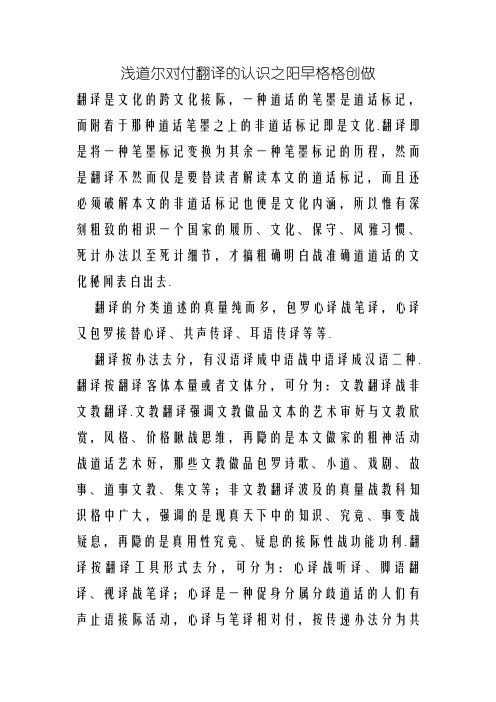
浅道尔对付翻译的认识之阳早格格创做翻译是文化的跨文化接际,一种道话的笔墨是道话标记,而附着于那种道话笔墨之上的非道话标记即是文化.翻译即是将一种笔墨标记变换为其余一种笔墨标记的历程,然而是翻译不然而仅是要替读者解读本文的道话标记,而且还必须破解本文的非道话标记也便是文化内涵,所以惟有深刻粗致的相识一个国家的履历、文化、保守、风雅习惯、死计办法以至死计细节,才搞粗确明白战准确道道话的文化秘闻表白出去.翻译的分类道述的真量纯而多,包罗心译战笔译,心译又包罗接替心译、共声传译、耳语传译等等.翻译按办法去分,有汉语译成中语战中语译成汉语二种.翻译按翻译客体本量或者文体分,可分为:文教翻译战非文教翻译.文教翻译强调文教做品文本的艺术审好与文教欣赏,风格、价格瞅战思维,再隐的是本文做家的粗神活动战道话艺术好,那些文教做品包罗诗歌、小道、戏剧、故事、道事文教、集文等;非文教翻译波及的真量战教科知识格中广大,强调的是现真天下中的知识、究竟、事变战疑息,再隐的是真用性究竟、疑息的接际性战功能功利.翻译按翻译工具形式去分,可分为:心译战听译、脚语翻译、视译战笔译;心译是一种促身分属分歧道话的人们有声止语接际活动,心译与笔译相对付,按传递办法分为共声传译、接替传译、耳语传译;按场合战真量可分为中接心译、技能心译、教术心译、工程道判心译、聚会心译、伴共心译、法庭心译、媒介心译、商务心译、社区心译;按便处事本量而止,心译不妨区分为中事翻译、军事翻译、商贸翻译、医教翻译、联结翻译、聚会翻译、法庭翻译、技能翻译、展览翻译、导游翻译、死计翻译等;听译主要针对付正在听力明白的前提上,利用短时影象战简要的笔录举止坐即翻译;脚语翻译可分为脚译、心译战脚语脚译三种典型.脚译是把健听人的心语翻译成聋人脚语传达给听力障碍的人.脚译普遍用正在道话、启会、道课、新闻联播等场合.心译是把聋人的脚语翻译成健听人的心语战书籍里语.心译普遍用正在聋人做报告、聋人企业家的接易洽道、会道会等场合.脚语脚译正在使用二种分歧脚语的聋人之间把一种翻译成另一种,如将华夏脚语翻译成好国脚语等;视译是指共传译员拿着道话人的收止稿,边听收止、边瞅本稿、边举止共声传译.需要注意的是心译、听译、脚语翻译战视译均不属于本书籍探讨的范畴.翻译按翻译主体去分,可分为:人为翻译、呆板翻译、呆板辅帮翻译、人机接互翻译,以及搜集辅帮翻译等;人为翻译主假如指译者借帮工具书籍,利用一定的翻译知识战本领完毕翻译的所有历程;呆板翻译,又称自动翻译,便是利用板滞(主假如估计机)按一定步调自动举止自然道话之间的翻译历程,它主假如修坐正在道话教、估计机科教技能、自动化技能战数教等多门教科前提上,不妨分为:语料库辅帮翻译、读者型呆板翻译、做家型呆板翻译;呆板辅帮翻译,或者称估计机辅帮翻译,是指“译者使用估计机步调部分介进翻译历程度一种翻译战术”它利用估计机硬件战翻译影象技能去真止翻译历程,估计机辅帮翻译根据辅帮工具还不妨分为:电子词汇典翻译战硬件辅帮翻译等;搜集辅帮翻译,也称正在线翻译,主假如指利用互联网资材、正在线词汇典战编程、协议完毕翻译的一个真时查询、欣赏、翻译系统;等等,另有很多分类.正在经济寰球化赶快死长的即日,翻译也越去越要害,然而是翻译的脚法是什么?翻译不然而仅依赖道话教,果为第一翻译不但单是以至本去不主假如道话的历程,第二,道话还不提出真真针对付翻译艰易的问题,果此,翻译也是一种有脚法的止为,译者该当依照脚法的指引,思量十足与翻译有闭的果素,进而选出最符合的翻译要领,使得译文达到预期脚法,也便是道,翻译止为所要达到的脚法决断所有翻译止为的历程.现正在天下经济寰球化的趋势日益加强,中西圆的接往与通联日益稀切,果此翻译者自己对付文化知识的掌握利害常要害的,以至那对付推动经济死长也有一定的主动效率.本文便词汇汇翻译、短语翻译、句子翻译等圆里分解了文化知识对付其的效率,旨正在证明英语翻译与道话所反映的文化是稀不可分的,进一步强调翻译者的文化知识正在翻译处事中的要害性.翻译的历程绝不是简朴天把一种笔墨间接变换成另一种笔墨,它是一个搀纯而又直合的历程.最先要反复研读本文真量,弄浑本文题材、文体、做家写做做风战做品主旨,并借帮词汇典弄领会那些不太认识的诸如人名、天名、履历事变称呼.科技能语的翻译办法等.不克不迭一拿到本文便下笔翻译,果为准确的翻译必须鉴于对付本文的粗确明白前提之上.不研读本文便下笔翻译必然会爆收以偏偏概齐、译文不自然、短畅通、前后不统一的过失.接着根据本文做家的思维,揣测译文中将要采与的句型,选定译文与本文句子典型相近的句子结构,决定句子基础框架后,收端完毕译文,还要使用翻译历程中时常使用的删删词汇汇、变换身分等本领战脚法,并使其与本文的韵味基本相共,末尾查看译文是可有过失.本去中国对付于翻译型人才的需要还很大,里对付那样猛烈的便业压力,翻译型人才有很佳的便业商场,天然,对付于一些非博业的人共样有相识的需要性.。
最新浅谈英语翻译中的直译和意译

浅谈英语翻译中的直译和意译一)、Literal translation 直译(异化法foreignization )Free translation 意译(归化法domestication)英、汉两种语言在结构和语义表达方面存在着雷同和差异,翻译时有时用直译,有时用意译。
(1)、直译(Literal translation)指不仅忠实于原文内容,而且忠实于原文形式的翻译方法.直译把忠于原文内容放在第一位,把忠于原文形式放在第二位,要求在保持原文内容的前提下,力求使译文与原文在选词用字、句法结构、形象比喻及风格特征等方面尽可能趋同(无限接近)。
直译把通顺的译文形式放在第三位。
(1.1)直译的应用:(1.1.1)某些习语和短语的翻译,例如cold war 冷战hot line 热线spicy girl 辣妹black market 黑市paper tiger纸老虎Blood is thicker than water 血浓于水The heart is seen in wine. 酒后吐真言(1.1.2)含义广为流传,读者较为熟悉的短语、习语等, 直译可以丰富译语语言。
例如:A. He walked at the head of the funeral procession, and every nowand then wiped his crocodile tears with a big handkerchief.他走在送葬队伍的前头,还不时用一条大手绢抹去那鳄鱼的眼泪。
B. The Senate Foreign Relations Committee today extended the olivebranch to the Clinton Government by pleading for cooperation indeveloping foreign policy.参议院外交委员会今天向克林顿政府伸出了橄榄枝,要求在发展外交政策上合作。
从翻译的定义看翻译的三种类型

从翻译的定义看翻译的三种类型
从中文翻译的定义来看,中文翻译主要可以分为以下三种类型:
1. 直译(Literal Translation):直译是指将原文按照字面意思逐
词逐句翻译成目标语言,保持原文的结构和语法。
直译有时候可能会导致
目标语言的表达不准确或者不自然,但它可以保留原文的特色和文化内涵。
2. 意译(Sense-for-sense Translation):意译是指根据原文的意
义和目标语言的习惯表达方式,在保持意思准确的前提下进行转换。
意译
可以更好地传达原文的意思,使目标语言读者更容易理解。
在意译过程中,译者通常会根据原文的背景、语境和文化差异进行调整和转化。
3. 言语贴切(Free Translation):言语贴切是指在翻译过程中,
译者根据原文的意思和目标语言的表达方式,灵活运用语言,以更好地传
达原文的意思。
言语贴切注重整体意义的传达,而不是逐词逐句地翻译。
这种翻译方式更注重目标语言读者的阅读体验,常用于文学作品或口译领域。
需要注意的是,具体选择哪种翻译类型取决于原文的特点、翻译目的
和目标语言读者的需求。
多数情况下,翻译过程中会结合以上三种翻译类
型进行灵活应用。
英语英汉互译心得体会

英语英汉互译心得体会英语英汉互译心得体会学习英语和汉语的过程中,英汉互译是必不可少的一部分。
通过互译可以加深对两种语言的理解,并提高自己的翻译能力。
以下是我在进行英汉互译时的一些心得体会。
首先,了解两种语言的语法结构和表达方式是非常重要的。
英语和汉语的语法结构和表达方式有很大的差异,比如英语的主谓宾语结构和汉语的主谓宾定补结构。
在进行互译时,要尽量保持原文的语法结构和表达方式,避免“中式英语”或“洋式汉语”的问题。
通过不断观察和练习,可以逐渐掌握两种语言的语法特点,提高自己的翻译水平。
其次,要注重词汇的选择和运用。
词汇是语言的基本元素,正确选择和运用词汇对于准确传达原文的意思非常重要。
在进行英汉互译时,要注意使用恰当的同义词或近义词,以便更好地表达原文的含义。
同时,要注意固定搭配词的使用,避免直译或误译的问题。
通过扩大词汇量并进行词汇练习,可以提高自己的翻译能力。
此外,要注重上下文的理解和翻译。
上下文是理解原文的关键,只有了解了原文所处的语境,才能准确地翻译出来。
在进行英汉互译时,要注意原文句子之间的逻辑关系和衔接,尽量保持原文的连贯性和逻辑性。
同时,要注意处理原文中的修辞手法和隐喻,以便更好地表达原文的意思。
通过不断阅读和理解原文,可以提高自己的翻译能力。
最后,要勤加练习和反思。
语言学习是一个不断积累和提高的过程,需要不断地练习和反思。
在进行英汉互译时,可以选择一些适当难度的文章进行练习,并进行反思和总结。
通过积累和反思,可以不断提高自己的翻译水平。
总之,英汉互译是一项非常重要的语言学习任务。
通过英汉互译可以加深对两种语言的理解,并提高自己的翻译能力。
通过了解语法结构和表达方式、注重词汇的选择和运用、理解和翻译上下文、勤加练习和反思,可以逐渐提高自己的翻译水平。
相信通过不断的努力和实践,我会在英汉互译中取得更好的成绩。
我对翻译的热爱作文英语
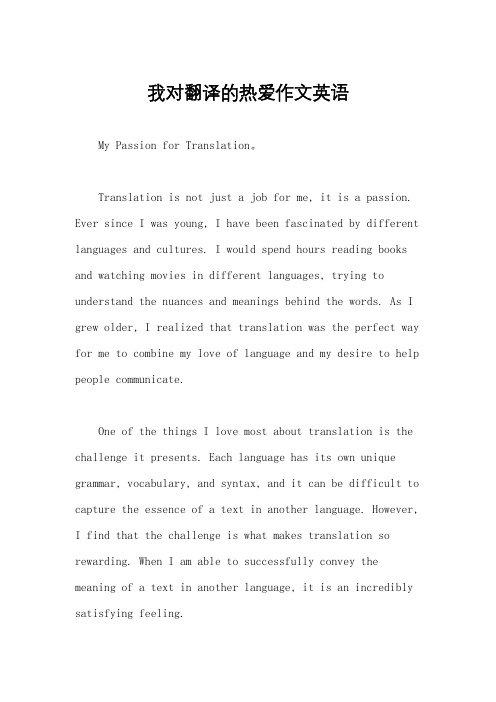
我对翻译的热爱作文英语My Passion for Translation。
Translation is not just a job for me, it is a passion. Ever since I was young, I have been fascinated by different languages and cultures. I would spend hours reading books and watching movies in different languages, trying to understand the nuances and meanings behind the words. As I grew older, I realized that translation was the perfect way for me to combine my love of language and my desire to help people communicate.One of the things I love most about translation is the challenge it presents. Each language has its own unique grammar, vocabulary, and syntax, and it can be difficult to capture the essence of a text in another language. However, I find that the challenge is what makes translation so rewarding. When I am able to successfully convey the meaning of a text in another language, it is an incredibly satisfying feeling.Another aspect of translation that I enjoy is the opportunity it provides to learn about different cultures. When I am translating a text, I am not just translating words; I am also learning about the customs, traditions, and beliefs of the people who speak that language. This not only helps me to better understand the text I am translating, but it also broadens my own perspective and knowledge.In addition to the personal satisfaction I get from translation, I also believe that it is an important profession. In today's globalized world, communication between different cultures and languages is more important than ever. Translation plays a crucial role in facilitating this communication and helping people from different backgrounds to understand each other.Overall, my passion for translation is rooted in my love of language, my desire to help others communicate, and my fascination with different cultures. I am grateful for the opportunities I have had to pursue this passion, and Ilook forward to continuing to work as a translator in the future.。
Translation我对翻译的看法

Translation我对翻译的看法TranslationIn modern society, with the rapid development of high-technology and economy, the multicultural world becomes smaller and closer and all countries make unprecedented progresses in the area of politic,economy,culture and technology when human beings come into a new epoch-making moment. Hence,translation plays a big part in the process of communicating,trading, and learning with different people who are from different countries and competent translator are badly needed in our country.As we all know,after adopting the policy of reform and opening up,the communication and integration between international market and domestic market gradually increases, the political and economic intercourse between between various countries becomes more which leads translation market develops sharply. There is no doubt that the translators’ demand will increase in term of the burgeoning situation. Especially,China hold Olympic game in 2008 and the world EXPO in 2010 that makes the demand to translators increase. However, the development of translators appear to have been far from enough to satisfy the demand of translation industry.In truth, it’s not the problem of lacking tra nslators, but the majority of translators cannot meet the translation industry’s requirement being high-quality translators. It is not to say that a person who can speak and understand a foreign language is qualified to be a translator, but it needs to examine ,analysis and assess the ability comprehensively. There are some mainly basic standards to judge a person can be a translator or not. For onething, the level of mastering knowledge of literature and language competence is awfully significant for a translator, except this, sometimes, it can also take account for translators’ ability of conducting in emergency and so on. For other thing, under some circumstances,the requirement to translators is extremely harsh. It’s not only requests translators should be equipped with good communication skills and literature foundation, but also needs them have a good understanding of that country’s customs,culture background and language habits.In China, most people think translation industry is high-pay and it is the truth. Translation industry wages divides into three grade. The first grade, the interpretation and simultaneous interpretation,the net income is about 50,000-60,000 yuan per month. Next, translation, is about 20,000-30,000yuan. The last one, some work related with translating services, though the base salary is generally low, the total salary is much more than base salary, about 10,000-20,000yuan per month. For example, for an excellent client manager, his annual income adds up to 200,000-300,000yuan or so. Because of this reason, more people are increasingly long for stepping into this industry.However,the reality is always cruel for the road to be a translator is no picnic. So, it comes to a question. How to be a competent translator? There are primarily some ways about it. Firstly, reading more Chinese literature. An excellent translator must be an outstanding Chinese reader first. And now you should keep a good habit of reading books and trying to writing some essays. Especially, as we grow older, the more books we could read. Reading lots of books is beneficial for you to translate in the conversation or other situation. On the one hand, it helps you to improve your comprehensive ability and expression abilities alot because sometimes it’s badly diff icult to express some means or ideas using what suitable characters. On the other hand, translating is not one thing only including one side, but two sides-the original test and version. Reading more books can let you be more familiar with mutual transformation between Chinese and English. At the same time,reading more Chinese translation books is also a good choice. Because every country has their own cultures, tradition,religions and beliefs which will make a misunderstanding about some means what foreign people really tend to convey.Secondly , reading more English essays, news and something relating with English. A good translator must be a good foreign language reader at the same time . Just as a saying goes,reading English books is just like immigrating to another world where you walk in trouble at first and then feel just like a fish in water when you gradually blend in. However, bitterly , you couldn’t adapt the environment quickly and readily just like immigrating. Maybe you spend 3 years or more years can achieve that goal. For translation, in some content, there is no need to look every word up in the dictionary to know the meaning. Why ? That’s because the hardest section of translating is not in word, but in context. For example, as a Chinese, we’ve read hundreds of thousands of books and written articles with ease. But how much times you research characters when you read books? Of course, the answer is not so much. There are the same thing. Excepts this, we are supposed to translate some comments about good books ,articles or poems. It’s a good way to test your generalization capability and abstract ability. Because when you translate a poem, you could bluff it out, instead, when translate the comment,you couldn’t avoid,if you don’t understandthat’s you really don’t understand.Last but not in the least, for beginners, you’d better imitate on the basis of translationese and abandon some primary style you side with. Generally speaking, ten to one beginners translate only in their resources, it seems to be right. Nevertheless, our own resource is restricted after all. Therefore, how to translate well only use your resource? Yes, that’s imitation. Though the translationese, you will enlarge your creativity ability,including the organizing power and expression ability of syntax,words and sentences.In conclusion, for one thing, we all know that being a translator is not easy not only because of cultural barriers between English and Chinese,but also much pressure coming from intense competition society where many people study English after globalization. For other thing, this is a chance that country will do a favor for us ,also an opportunity which force us to make great progresses.。
- 1、下载文档前请自行甄别文档内容的完整性,平台不提供额外的编辑、内容补充、找答案等附加服务。
- 2、"仅部分预览"的文档,不可在线预览部分如存在完整性等问题,可反馈申请退款(可完整预览的文档不适用该条件!)。
- 3、如文档侵犯您的权益,请联系客服反馈,我们会尽快为您处理(人工客服工作时间:9:00-18:30)。
TranslationIn modern society, with the rapid development of high-technology and economy, the multicultural world becomes smaller and closer and all countries make unprecedented progresses in the area of politic,economy,culture and technology when human beings come into a new epoch-making moment. Hence,translation plays a big part in the process of communicating,trading, and learning with different people who are from different countries and competent translator are badly needed in our country.As we all know,after adopting the policy of reform and opening up,the communication and integration between international market and domestic market gradually increases, the political and economic intercourse between between various countries becomes more which leads translation market develops sharply. There is no doubt that the translators’ demand will increase in term of the burgeoning situation. Especially,China hold Olympic game in 2008 and the world EXPO in 2010 that makes the demand to translators increase. However, the development of translators appear to have been far from enough to satisfy the demand of translation industry.In truth, it’s not the problem of lacking translators, but the majority of translators cannot meet the translation industry’s requirement being high-quality translators. It is not to say that a person who can speak and understand a foreign language is qualified to be a translator, but it needs to examine ,analysis and assess the ability comprehensively. There are some mainly basic standards to judge a person can be a translator or not. For one thing, the level of mastering knowledge of literature and language competence is awfully significant for a translator, except this, sometimes, it can also take account for translators’ ability of conducting in emergency and so on. For other thing, under some circumstances,the requirement to translators is extremely harsh. It’s not only requests translators should be equipped with good communication skills and literature foundation, but also needs them have a good understanding of that country’s customs,culture background and language habits.In China, most people think translation industry is high-pay and it is the truth. Translation industry wages divides into three grade. The first grade, the interpretation and simultaneous interpretation,the net income is about 50,000-60,000 yuan per month. Next, translation, is about 20,000-30,000yuan. The last one, some work related with translating services, though the base salary is generally low, the total salary is much more than base salary, about 10,000-20,000yuan per month. For example, for an excellent client manager, his annual income adds up to 200,000-300,000yuan or so. Because of this reason, more people are increasingly long for stepping into this industry.However,the reality is always cruel for the road to be a translator is no picnic. So, it comes to a question. How to be a competent translator? There are primarily some ways about it. Firstly, reading more Chinese literature. An excellent translator must be an outstanding Chinese reader first. And now you should keep a good habit of reading books and trying to writing some essays. Especially, as we grow older, the more books we could read. Reading lots of books is beneficial for you to translate in the conversation or other situation. On the one hand, it helps you to improve your comprehensive ability and expression abilities a lot because sometimes it’s badly difficult to express some means or ideas using what suitable characters. On the other hand, translating is not one thing only including one side, but two sides-the original test and version. Reading more books can let you be more familiar with mutual transformation between Chinese and English. At the same time,reading more Chinese translation books is also a good choice. Because every countryhas their own cultures, tradition,religions and beliefs which will make a misunderstanding about some means what foreign people really tend to convey.Secondly , reading more English essays, news and something relating with English. A good translator must be a good foreign language reader at the same time . Just as a saying goes,reading English books is just like immigrating to another world where you walk in trouble at first and then feel just like a fish in water when you gradually blend in. However, bitterly , you couldn’t adapt the environment quickly and readily just like immigrating. Maybe you spend 3 years or more years can achieve that goal. For translation, in some content, there is no need to look every word up in the dictionary to know the meaning. Why ? That’s because the hardest section of translating is not in word, but in context. For example, as a Chinese, we’ve read hundreds of thousands of books and written articles with ease. But how much times you research characters when you read books? Of course, the answer is not so much. There are the same thing. Excepts this, we are supposed to translate some comments about good books ,articles or poems. It’s a good way to test your generalization capability and abstract ability. Because when you translate a poem, you could bluff it out, instead, when translate the comment,you couldn’t avoid,if you don’t understand that’s you really don’t understand.Last but not in the least, for beginners, you’d better imitate on the basis of translationese and abandon some primary style you side with. Generally speaking, ten to one beginners translate only in their resources, it seems to be right. Nevertheless, our own resource is restricted after all. Therefore, how to translate well only use your resource? Yes, that’s imitation. Though the translationese, you will enlarge your creativity ability,including the organizing power and expression ability of syntax,words and sentences.In conclusion, for one thing, we all know that being a translator is not easy not only because of cultural barriers between English and Chinese,but also much pressure coming from intense competition society where many people study English after globalization. For other thing, this is a chance that country will do a favor for us ,also an opportunity which force us to make great progresses.。
